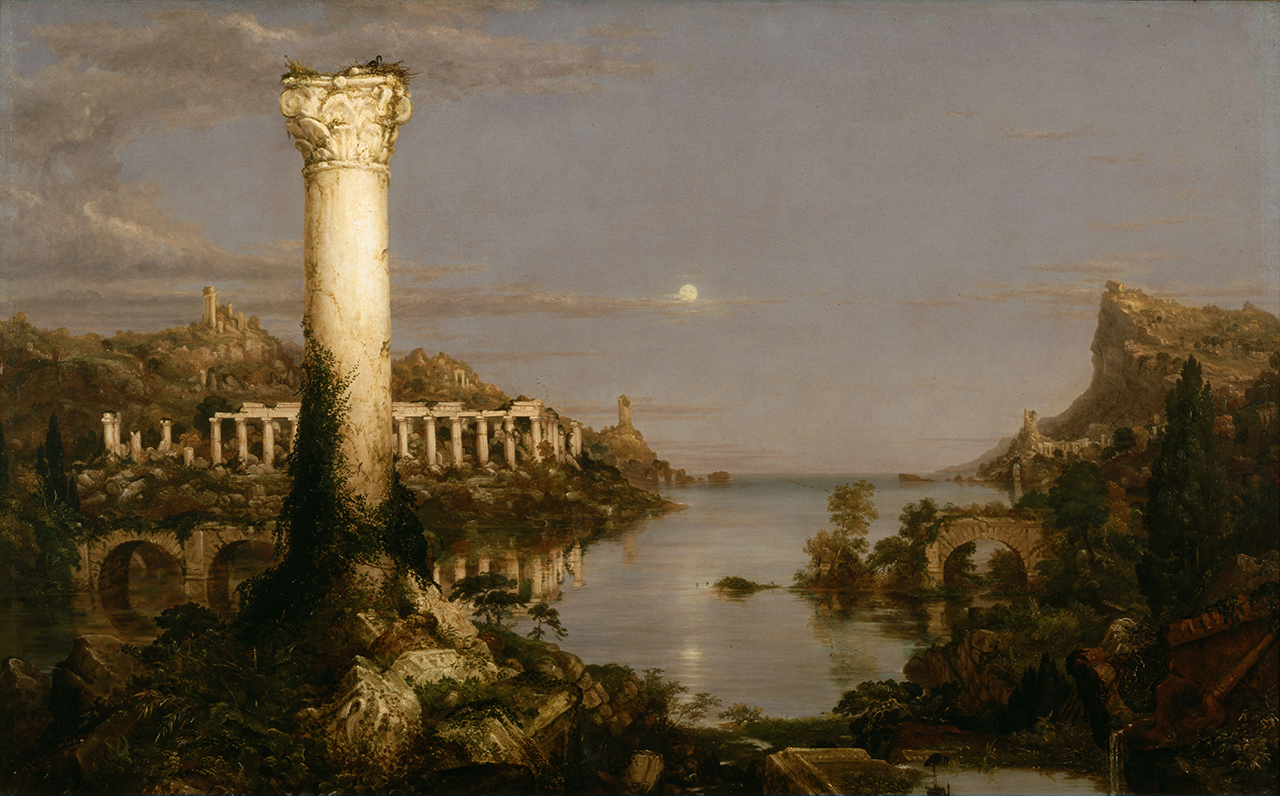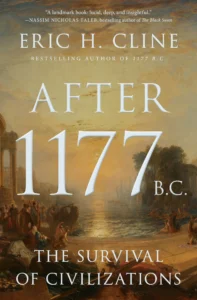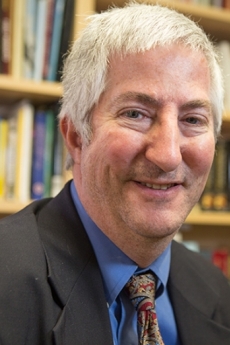The Survival of Civilizations
After 1177 BCE
Eric Cline
Professor of History, Classics, and Anthropology
Director, GWU Capital Archaeological Institute
George Washington University
Sponsored by PSW Science Member Edward Gadasu
About the Lecture

In the years after 1177 BCE, many of the Late Bronze Age civilizations of the Aegean and Eastern Mediterranean lay in ruins, undone by invasion, revolt, natural disasters, famine, and the demise of international trade. An interconnected world that had boasted major empires and societies, relative peace, robust commerce, and monumental architecture was lost. This lecture will trace the compelling story of what happened during the four centuries after 1177 BCE, across the wide swath of the Aegean and Eastern Mediterranean world. It is a story of resilience, transformation, and success, as well as failures, in an age of chaos and reconfiguration. Those that failed to adjust disappeared from the world stage, while others transformed themselves, resulting in a new world order that included Israelites, Philistines, Phoenicians, Neo-Hittites, Neo-Assyrians, Neo-Babylonians, and world-changing innovations such as the use of iron and standardization of the alphabet. It is now clear that this period, far from being the First Dark Age, was a new age with new inventions, new opportunities, and lessons for today.

About the Speaker

Eric H. Cline is Professor of Classics, History, and Anthropology and Director of the Capitol Archaeological Institute at the George Washington University. He is also former Chair of the Department of Classical and Near Eastern Languages and Civilizations there. Eric is a National Geographic Explorer, NEH Public Scholar, Getty Scholar, and Fulbright Scholar.
Eric is an active field archaeologist with more than 30 seasons of excavation and survey experience in Israel, Egypt, Jordan, Cyprus, Greece, Crete, and the United States, including ten seasons at Megiddo (1994-2014), where he served as co-director before retiring from the project in 2014, and another ten seasons at Tel Kabri, where he currently serves as Co-Director. He is the author or editor of 20 books and nearly 100 articles; translations of his books have appeared in nineteen different languages. Among them are Three Stones Make a Wall: The Story of Archaeology; Digging Deeper: How Archaeology Works; 1177 BC: The Year Civilization Collapsed and (with Glynnis Fawkes) 1177 BC: A Graphic History of the Year Civilization Collapsed; and After 1177 BC: The Survival of Civilizations (all Princeton).
Eric earned an AB in Classical Archaeology with Anthropology at Dartmouth and an MA in Near Eastern Languages and Literatures at Yale. He studied at the American School of Classical Studies in Athens and then went on to earn a PhD in Ancient History at U Penn. Eric is also the recipient of an honorary PhD from Muhlenberg College.
Minutes
On March 8th, 2024, in the Powell Auditorium of the Cosmos Club in Washington, D.C., President Larry Millstein called the 2,491st meeting of the Society to order at 8:08 p.m. ET. He began by welcoming attendees, thanking sponsors for their support and announcing new members. Scott Mathews then read the minutes of the previous meeting which included the lecture by Bartek Rajwa, titled “Spectroscopy of Deception: Unmasking Food Fraud with Biophysics”. The minutes were approved as read.
President Millstein then introduced the speaker for the evening, Eric Cline, of George Washington University. His lecture was titled “Survival of Civilizations: After 1177 BCE”.
The speaker began by noting his previous PSW lecture in 2015 on the events leading up to 1177 BCE, and that the present lecture would be “a sequel”, detailing the response of several civilizations to these events. Cline showed a map of the “G8 of the Late Bronze Age”, which included the civilizations of the Mycenaeans, Minoans, Egyptians, Hittites, Canaanites, Cypriots, Assyrians, and Babylonians. He showed a diagram of the trade routes connecting these eight major civilizations (as well as four smaller civilizations) which constituted a “small world network”, in that each society was not more than three hops from all the others. Cline said that within a few decades of 1177 BCE, all of these trade routes, and many of the trading civilizations, had collapsed.
The speaker said that while the collapse at the end of the Late Bronze Age was not well-known, the magnitude of the catastrophe was enormous; comparable to the fall of the Roman Empire. Cline stated that he believed this collapse was caused by a number of factors, occurring simultaneously or in rapid succession, including: drought, famine, earthquakes, and invaders. He then showed archeological evidence for each of these factors, occurring during this period of time.
Cline then stated that the Late Bronze Age Collapse constituted a “Systems Collapse”. He defined the specific features of systems collapse: 1) collapse of the central administrative organization; 2) disappearance of the traditional elite class; 3) collapse of the centralized economy; and 4) settlement shifts and population decline. He indicated that in response to this systems collapse, some civilizations did better than others.
Cline then presented the concepts of resilience, anti-fragility, and the adaptive cycle, discussing how these features increase the capacity to recover from extreme impact events. He noted that while many of these ideas were taken from modern, IPCC documents written in consideration of climate change, all the concepts and definitions were accurate and appropriate for the Late Bronze Age collapse.
He then compared the response of each of the individual societies to the collapse, and using the previously defined concepts of resilience and adaptation as metrics, he gave each society or geographic area a numeric score. He indicated that while he may have “massaged the numbers” using his gut feeling, he was quite confident about his final ranking of the civilizations. The end result was:
• Phoenicians and Cypriots were anti-fragile (highest score)
• Assyrians, Babylonians, and Neo-Hittites were resilient
• Egyptians were adapting
• Mycenaeans and Minoans were not resilient, but had some survivors
• Hittites and southern Canaanites disappeared (lowest score)
Cline then went through specific arguments, justifying the rankings of each civilization with evidence from the archeological record. He provided evidence that some members of the poorer performing societies (Hittites and southern Canaanites), may have been assimilated into more successful societies.
Cline ended his lecture by arguing that the analysis and discussion of the response to the late bronze age collapse is directly relevant to “what is happening to us today, with climate change, a pandemic, social upheaval, supply chain issues, and so on…”.
The lecture was followed by a Question and Answer session.
One member asked a question concerning the Dorians. Cline responded that there is no historical evidence for the Dorian invasion.
A non-member asked a question about the “explosion” of ancient DNA and the impact on Cline’s research. Cline responded that several recent results of A-DNA (or ancient DNA) have significantly impacted his research, and that he believes that A-DNA may constitute a significant part of a “3rd wave” of modern archeology.
A member asked about the details of what happens to the people living in a city when the city falls, or is conquered by invaders: are the people slaughtered or do they flee? Cline responded that both death and migration occur, to varying degrees. He gave examples where a significant fraction of the conquered population flees and migrates into another group, and others where large fractions of the population die, either at the hands of the invaders or in the aftermath.
A viewer on the YouTube channel asked how the collapse impacted the sea trade around the Mediterranean. Cline responded that for a period after the collapse, possibly several decades, the trade network was “broken”, with imports being drastically reduced in all the affected areas.
After the question and answer period, President Millstein thanked the speaker and presented him with a PSW rosette, a signed copy of the announcement of his talk, and a signed copy of Volume 1 of the PSW Bulletin. He then announced speakers of up-coming lectures, made a number of housekeeping announcements, and invited guests to join the Society. He adjourned the 2491st meeting of the society at 10:18 pm ET.
Temperature in Washington, DC: 10.5° Celsius
Weather: Mostly cloudy
Audience in the Powell auditorium: 93
Viewers on live stream: 52 …for a total of 145 live viewers
Views of the video in the first two weeks: 1,716
Respectfully submitted, Scott Mathews: Recording Secretary